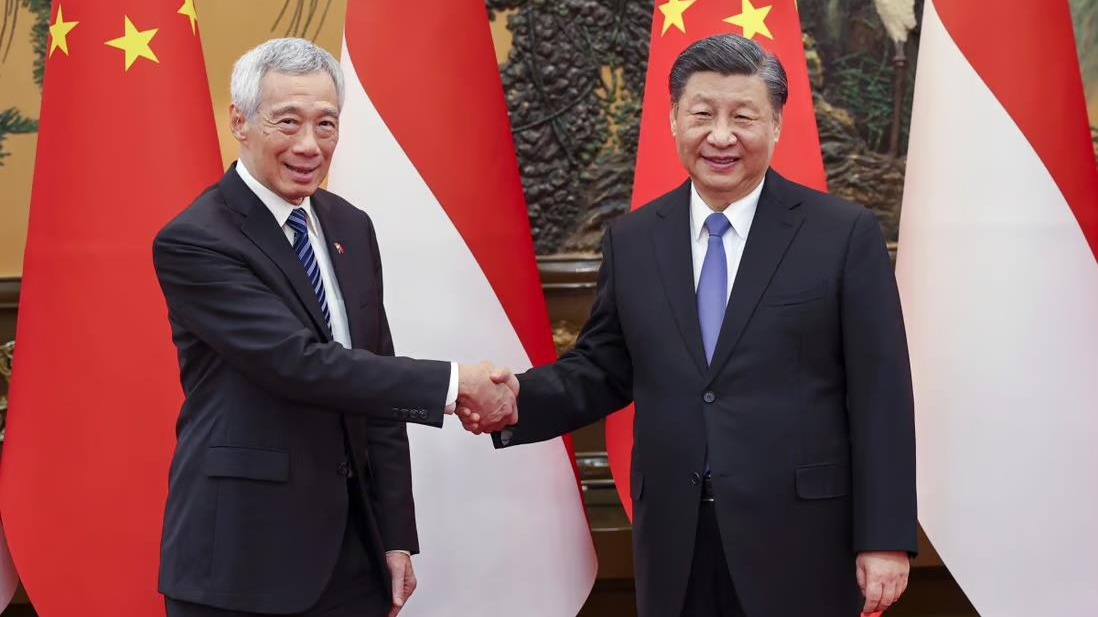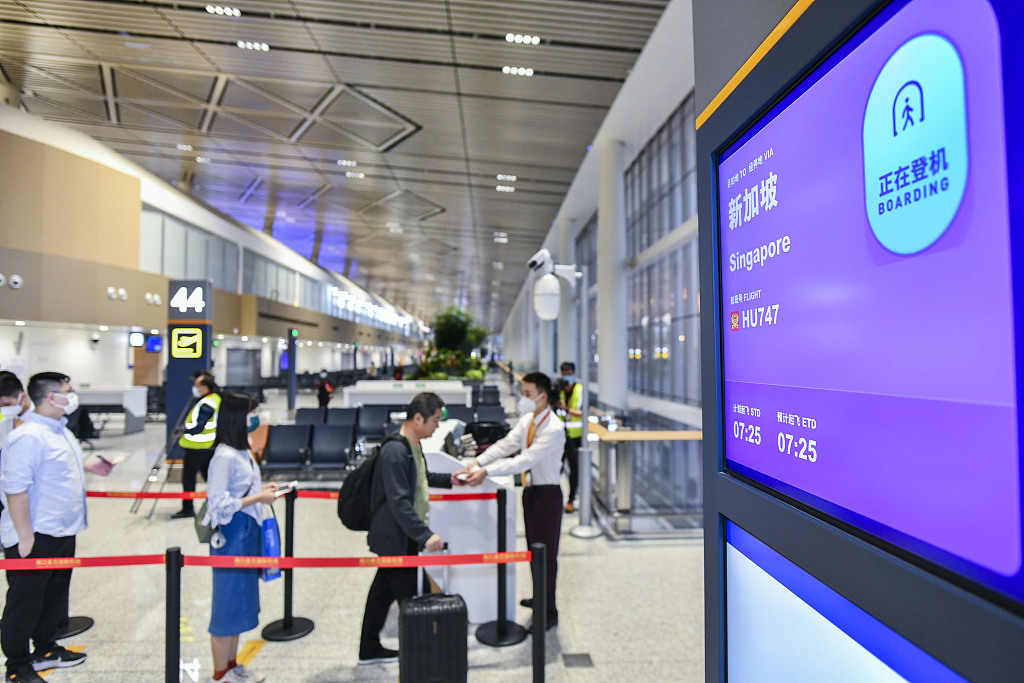
Chinese President Xi Jinping meets with Singaporean Prime Minister Lee Hsien Loong in Beijing, capital of China, March 31, 2023. /Xinhua
Chinese President Xi Jinping meets with Singaporean Prime Minister Lee Hsien Loong in Beijing, capital of China, March 31, 2023. /Xinhua
Editor's note: Yu Hong is senior research fellow at the East Asian Institute, National University of Singapore. The article reflects the author's opinions and not necessarily the views of CGTN.
From March 27 to April 1, Singaporean Prime Minister Lee Hsien Loong made a visit to China. It has been almost four years since Prime Minister Lee's last visit to China in April 2019.
The Singaporean prime minister's trip to China was substantive. First, Lee Hsien Loong met with Chinese President Xi Jinping. Both countries agreed to upgrade bilateral relations to an "All-Round High-Quality Future-oriented Partnership." This reflects both countries' commitment to further expand bilateral cooperation and explore new areas for collaboration, including digital and green economy, finance, aviation, and industrial cooperation. President Xi called the bilateral relations between China and Singapore "forward-looking, strategic and exemplary." This sets the benchmark for other countries in the region.
Singapore's relations with China are thriving. Their bilateral trade maintained strong momentum even during the global COVID-19 pandemic. In 2022, according to China's Ministry of Foreign Affairs, the bilateral trade volume between China and Singapore reached $115.13 billion, which saw a year-on-year increase of 22.8 percent. The Chinese economy is recovering fast from the COVID-19 pandemic, and it remains dynamic and energetic. Despite China's ageing population, its workforce is becoming increasingly educated and skilled. Singapore and China are working together to upgrade the China-Singapore Free Trade Agreement, which is expected to provide a further boost to bilateral trade and investment.
Second, during Prime Minister Lee's visit, he had candid conversations with China's leadership, including President Xi Jinping, Premier Li Qiang, Chairman of the National People's Congress Zhao Leji and Chairman of the Chinese People's Political Consultative Conference Wang Huning. It is rare for a visiting foreign dignitary to meet so many Chinese leaders on the same trip.
Third, Prime Minister Lee met the Guangdong Party Secretary, Huang Kunming, and Beijing Party Secretary Yin Li. Singapore was among the earliest and most engaged countries in China's reform and opening-up. Singapore has been deeply involved in regional development in China.
Singapore and China are engaged in four government-to-government projects located in Suzhou, Tianjin, Chongqing, and Guangzhou respectively. These projects were aligned with China's priorities in its different stages of reform and opening-up. As Lee Hsien Loong stressed during his speech to the Boao Forum for Asia Annual Conference 2023, "Our government-to-government cooperation projects have matched China's priorities at different stages of its development."
Singapore seeks to expand its cooperation with China under the Belt and Road Initiative (BRI), which is both a modern version of the historical Silk Road and a globally oriented cooperation initiative. Countries in the region hope to benefit from opportunities brought by China's economic development and attract more investment by participating in the BRI. Meanwhile, the Chinese government sees Singapore as a major player in promoting its neighborhood diplomacy and its push for the BRI.
China-Singapore Chongqing Connectivity Initiative is a flagship project under the BRI. This project is intended to promote economic and trade ties between China's western provinces and the Southeast Asian countries, and achieve further integrated regional economic development. Through the connectivity between Chongqing and Singapore, the western region will become more widely connected with Singapore and other regional countries.
The New International Land-Sea Trade Corridor is a key cooperation project under the Chongqing Connectivity Initiative, and the Qinzhou Port in Guangxi Zhuang Autonomous Region is at the intersection of sea and land routes of the new land-sea corridor. The new international land-sea corridor provides a more convenient way for China's western provinces to access the sea. For Singapore, this project can also provide a platform to enable Singapore enterprises to participate fully in the BRI and connect with the western region of China.
During Prime Minister Lee's visit to China, both countries agreed to work closely towards resuming flight connectivity and people-to-people exchanges to pre-pandemic levels, as a boost to both countries' economies in the post-pandemic recovery period.

Travelers board a plane that will depart from Haikou Meilan International Airport to Singapore, in Haikou, south China's Hainan Province, March 15, 2023. /CFP
Travelers board a plane that will depart from Haikou Meilan International Airport to Singapore, in Haikou, south China's Hainan Province, March 15, 2023. /CFP
Singapore greatly values its ties with China. China is among the world's largest economies and the world's largest goods trading nation. China has been Singapore's largest trading partner in goods since 2013. More and more Chinese firms are investing in Singapore and setting up regional headquarters and operation centers there, leveraging its status as an important financial center in the region.
Many Singaporean firms such as CapitaLand, Mapletree, Raffles Medical Group, and Bread Talk have invested heavily in China, and seek to further expand their business operations there. The Chinese consumer market is huge and still expanding, with a growing middle class.
Singapore's strong ties with China, built up over many years, provide a firm foundation for further cooperation. Singapore welcomes China's commitment to continue opening up its economy and supporting regional cooperation. Singapore welcomes and supports China's bid for membership of both the Comprehensive and Progressive Agreement for Trans-Pacific Partnership (CPTPP) and the Digital Economy Partnership Agreement (DEPA). Singapore is one of the initiator countries and a founding member of both the CPTPP and DEPA, which are high-standard regional free trade agreements particularly relating to services and digital economy.
Singapore is deeply worried over the tensions between the United States and China, which could generate spillover effects on the regional countries. As an open and trade-dependent economy, Singapore is unwilling to take sides in the rivalry between China and the United States, seeking to maintain good relations with both, and hopes that Sino-U.S. relations can be stabilized.
(If you want to contribute and have specific expertise, please contact us at opinions@cgtn.com. Follow @thouse_opinions on Twitter to discover the latest commentaries on CGTN Opinion Section.)